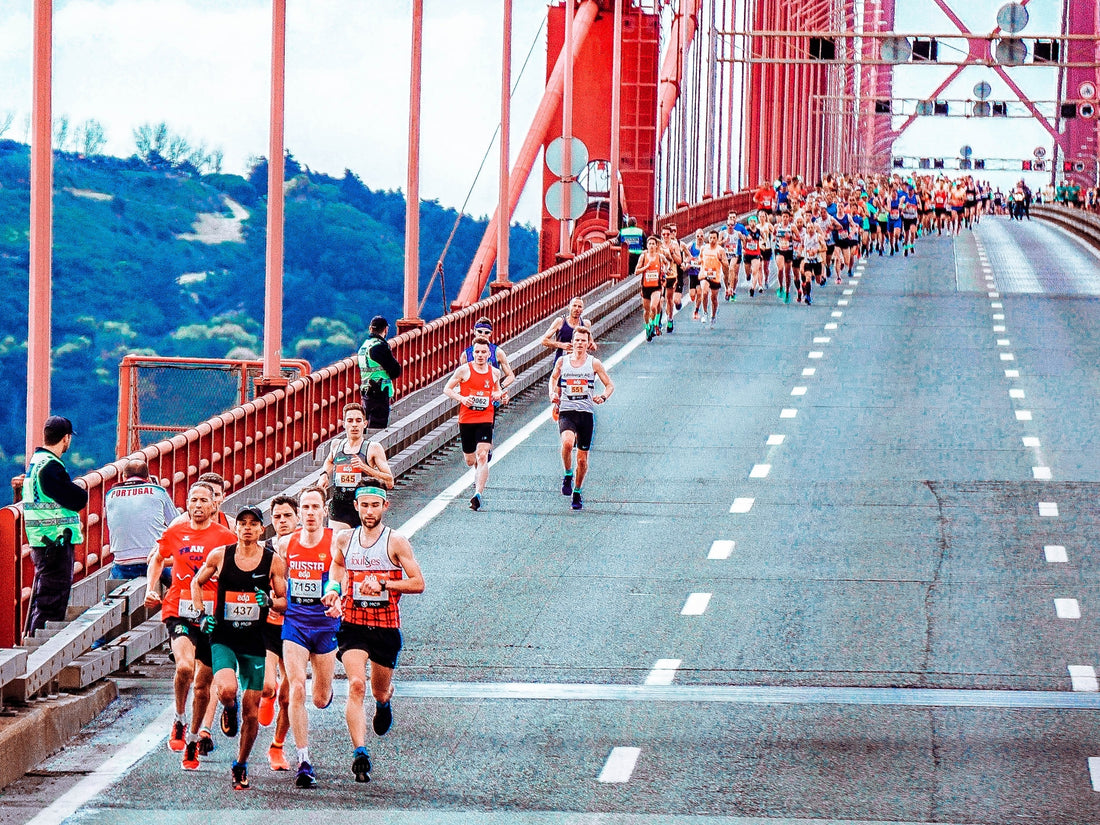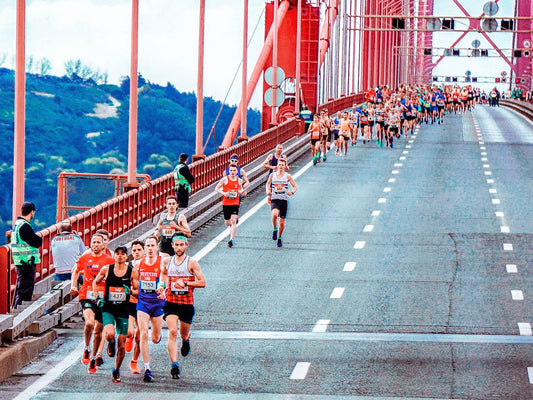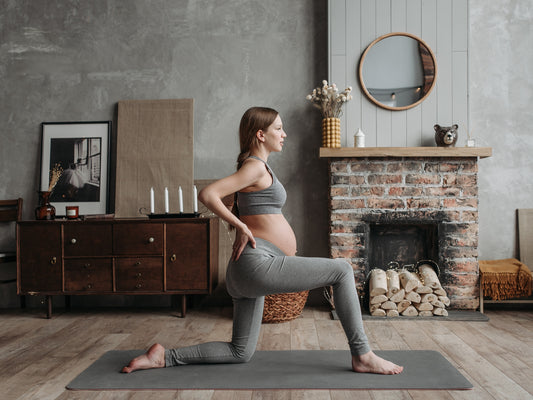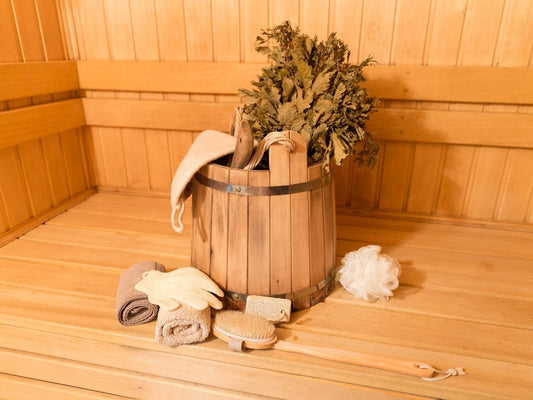Importance of Hydration for Marathon Runners
If you’re a marathon runner, you probably know already that staying hydrated is key to preserving your health and performance. Water is important for runners’ bodies as it helps to avoid overheating, removes toxins, protects joints, and provides energy to cells. A properly hydrated marathon runner recovers quicker, lowers their risk of injury and cramps, and has a better performance overall [1].
When we run, our body generates more heat than when we are resting [2]. To cool down, our body sweats, a process through which we lose water and electrolytes like potassium and sodium. A marathon runner is dehydrated if they lose more than 2-3% of body weight through sweating.
Apart from low performance, hydration leads to other consequences, too. These include fatigue, cramps, headaches, and even dizziness [3].

Marathon runners that do not hydrate sufficiently are likely to suffer from:
- Heat exhaustion, nausea, headache, increased body temperature, loss of appetite, dizziness, and cramps.
- If you suffer from heat exhaustion and your body temperature goes above 41 degrees, heatstroke is very likely; in case of confusion, disorientation, and a lack of sweat, you need to seek immediate help.
- Muscle cramps because of the loss of electrolytes during sweating.
To avoid all of these symptoms and maximize your performance during marathons, you should know the best way to hydrate before, during, and after the marathon. Let’s step up your hydration game.
Best Ways to Hydrate
Before Marathon
Some marathon runners opt for pre-hydration. This stage is recommended if you have workouts or races within less than 12 hours, so your body is not fully recovered. In general, you should pre-hydrate your body 4 hours before the marathon. The recommended pre-hydration amount is about 0.17-0.23 oz of fluids per 2.2lb of body weight.
The best way to hydrate before a marathon is to add some sodium to help you retain the water. For instance, you may consume drinks with electrolytes or have a sodium-rich snack before the marathon.
Pre-hydration before a marathon may not be necessary if you are already well hydrated. It’s usually recommended if you have already been in a race and you are likely to be dehydrated at the start of the new race.
During a Marathon
The best way to hydrate during a marathon depends on the length of the race. If you run for less than 5 miles, hydration during the marathon may not be required. If you are running for about 30-45 minutes, you won’t need hydrating liquids unless it’s very hot outside. In both these cases, you can simply hydrate at the end of your race.
If you run more than 5 miles or for more than 45 minutes, or you’re running in very hot weather, make sure to plan your hydration carefully. In general, you’ll want to get water with you and take a sip whenever you feel thirsty. Avoid drinking large amounts of water at once to prevent it from sloshing in your stomach.
After a Marathon
Dehydration is normal for most runners and very mild dehydration can be easily reversed as soon as you finish the marathon. Try having about 16 oz of liquids in the first 30 minutes after you finish your race.
For a better accurate measure of how much you need to drink to replenish the water you lost, you should know how much you sweat. You should drink about 20-24 ounces of liquid per pound lost [4].
If you cannot measure the amount of sweat, you can easily identify if you are dehydrated. One of the main symptoms is dark yellow urine – in this case, you need to keep drinking.
Tips for Marathon Runners to Stay Hydrated
Marathon runners may have a hard time trying to stay hydrated. Mild dehydration is also common after a race, but it can be easily reversed after.
To improve your hydration levels, always try to drink evenly throughout the whole day, not all at once. Also, we get hydrated through our diet, too. Fruits and vegetables have high water content.
You shouldn’t only drink water when you feel thirsty (unless you are running). Throughout the day, it’s best to take frequent sips from a water bottle even if you don’t feel thirsty.
If you consume alcohol, always make sure to rehydrate after, and combine alcohol with a hydrating liquid (such as sipping from a glass of water from time to time, not only alcohol). Alcohol dehydrates you and may lead to a higher risk for injury.
Next, there are several things you should know about the options you have to hydrate your body.

Plain water
Always start your daily hydration routine with plain water. For most people, plain water is sufficient to stay hydrated as long as you don’t go through exhausting workouts, races, or exercising in hot weather.
Once you start training for a race, plain water is no longer sufficient. When you sweat, you don’t only lose water, but also electrolytes and minerals. As a result, you need to have a solid plan to replenish your electrolyte levels. If you sweat a lot, or you need to run a long race, plain water will not provide you with everything you need to stay properly hydrated.
Electrolyte Supplements
There are many ways to supplement your electrolyte intake to make up for the minerals and electrolytes you lose when sweating, including hydration drinks with electrolytes, capsules with electrolytes, or chewable tablets, among others.
The right electrolyte hydration option depends on your preference, workout, how much you sweat, what your rehydration plan is, and the concentration of the supplement. Some brands may work better for your body than others.
Also, the form of these supplements is important for when you want to use them. For instance, you may like the idea of taking a tablet, but this may be difficult if you are running. If you want to stay hydrated during the marathon, getting a powder electrolyte mix that you can add to your water bottle may be more convenient.
Replenishing Energy Levels
Many hydrating mixes that contain electrolytes are sugar-free, while most sports drinks contain sugar and carbohydrates. Depending on your workout strategy, these may not be necessary. For instance, if your workout lasts less than one hour and a half, you may not need to ingest carbs. But you’ll arguably find them useful if you go for endurance running.
Just like with electrolyte-rich products, sports drinks are quite different, so some brands may or may not work for you. Sugar may also be in different forms, such as fructose which may lead to digestive distress for some people. Sports drinks are still a very easy way to consume calories during your race, as it’s best not to have solid food when you’re running.
That being said, watch your carb intake carefully when exercising. In case you overdo it, you will end up with an upset stomach. Using multiple carbs sources at the same time - such as gels, chews, and drinks - will decrease your performance as your body tries to cope with many sources of carbs at once.
How to Prevent Dehydration During a Marathon

Preventing dehydration during a marathon may not be entirely possible. It’s normal to lose fluids and electrolytes as you sweat, so you will most likely end up with mild dehydration at the end. Mild dehydration means losing about 1-2% of your body weight during the marathon, but it’s important to manage this mild dehydration to prevent severe dehydration complications, such as seizures or even death.
The tips above will help you stay hydrated before, during, and after your marathon. Having sips of water throughout the whole day as opposed to drinking a huge amount at once is best to keep dehydration at bay.
Also, to prevent dehydration during a marathon, you need to carefully plan your electrolytes intake. Fortunately, there is a wide variety of electrolyte mixes available, and some of them are specially created to boost your energy while keeping you hydrated. Thanks to a balanced mix of caffeine and l-theanine, our Hydrant Energy Line will make you feel more alert and focused while also providing a healthy combination of electrolytes.
During a marathon, you may want to make sure you have permanent access to water. For instance, you can plan the race to go next to drinking fountains or have a loop route that allows you to return to a place where you have a water bottle.
If altering the route is not possible, then you can opt for hydration clothing. For instance, there are vests for runners that allow them to carry a water bottle.
Overall, hydration is crucial for marathon runners. It impacts health and performance, and marathons can severely dehydrate you. To avoid symptoms, you can pre-hydrate, or make sure that you don’t start the race already dehydrated. Avoiding alcohol can help prevent dehydration: in case you do have alcohol, however, remember to drink plenty of hydrating liquids.
Choosing an optimal amount of electrolytes, carbs, and other nutrients may be difficult, but having a healthy lifestyle and diet and consulting a professional may help you understand what your body needs to stay healthy and maintain peak performance.
References
















